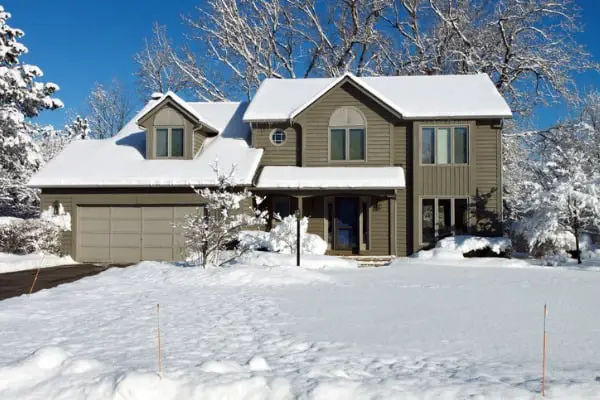
Although a fresh dusting of snow can be beautiful, cold and icy conditions accompanying it is a safety concern. If there is a sudden freeze or if the snow melts and then refreezes, your driveway can become slick in the cold months. Slippery conditions can cause serious injuries such as unintentional falls, a significant cause of nonfatal injury.
Since concrete driveways are expensive, you need to do everything you can to make them last as long as possible. There are a variety of ways you can employ to protect your driveway from damage. You need to consider all of them carefully before deciding which is best suitable for your home or business. In this article, you will learn about some of the most popular methods used.
Quick Navigation
1. Sodium chloride
Sodium chloride is commonly known as rock salt. It is categorized as a chemical deicer. One of the reasons why it is prevalent is because it is easy to apply. Also, it can melt both snow and ice and performs reasonably well in temperatures reaching up to 20°F. However, studies have indicated that sodium chloride is corrosive to the concrete and harmful to the environment. It also damages plants that it comes into contact with and irritates the skin of your pet. It requires cleaning up and reapplied with subsequent snow or ice.
2. Potassium chloride
Potassium is another kind of chemical deicer that is typically sprinkled over ice to help it melt. It is best effective at around 12°F temperatures and is thought to be less harmful to nearby vegetation than calcium chloride. Its disadvantage is that it works slightly slower than other related chemical deicers and needs clean-up and re-application with every snowfall.
3. Calcium chloride
Calcium chloride melts faster and is less harmful to the concrete surface than rock salt. It is also effective in much lower temperatures compared to other chemical deicers. It would help if you took care not to use too much of it as it can cause damage to plants. As with most chemical deicers, you have to clean and reapply it with every snowfall making it physically draining in times of extreme weather.
4. Resin-bound driveways
Resin-bound driveways significantly improve drainage by allowing water to flow through the porous surface ultimately. It also protects the driveway from damage by stopping water which later turns into ice from building up. Resin-bound driveways are ideal for sloping driveways since they offer much more grip than tarmac. With the help of resin bound driveway experts, choose a color and design suitable for your home to guarantee the best results. Our resin bond drives are mixtures of gravel held together in a UV stable and transparent resin Giving your driveway a smooth surface that is easy to clean and maintain. Ensure that you contract a competent company to carry out the installation for you. Resin-bound driveways have some extraordinary qualities not possessed by other types of driveways.
5. Heated driveways
Heating driveways and walkways is an increasingly popular option to tackle snow and ice, following the trend toward in-floor heating inside the house. The heated mats are permanently installed below your driveway. They are ideal if you do not want to worry about handling snow and ice. The heating mechanism usually activates automatically for your convenience and can increase the value of your home. However, it is significantly more expensive than topical treatments for snow and ice removal. Another disadvantage is that you can only install it beneath a new walkway before laying the concrete, tiles, or stones. Although doing it yourself is an option to save labor costs, a professional electrician is highly recommended for the electrical hookup. Heated mats offer the best all-around option for simple, worry-free ice removal. They are practical, efficient, and easy to install, while the heated surface provides an attractive and environmentally friendly choice.
6. Snow removal equipment and machines
You may want to consider powered options to remove snow or ice depending on factors such as the amount of ice or snow received in your area and your ability to tackle physical work around the house. Snow removal machines remove snow reasonably quickly and are available in various sizes to accommodate different needs and spaces. Equipment such as shovels requires minimal financial investment and offers an excellent opportunity to exercise. Every time you work with a shovel, you can burn up to 130 calories for every 15 minutes of work. However, the most labor-intensive option may not be possible for older or those not in good health. Snow removal equipment requires investment in specialized tools that may need storage for the rest of the year when it is not snowing. They may not also be compelling enough on ice; hence additional deicers or tools may be needed. Shoveling is the most time-consuming method to remove snow, and you may need to use a deicer or pick to remove compact snow or ice. Do not forget to have the proper footwear to ensure stable footing while shoveling.
7. Improving traction
Increase traction using sand, resin, wood chips, and straw to avoid the walkway slip and slide. Although sand provides an excellent grip for slippery surfaces, it can travel into storm drains, causing clogs and impacting local water systems negatively. It also tracks into your home and damage wood floors and carpets, and since it does not melt the ice, it can look unsightly on your driveway. Wood chips or straw are better environmental choices than sand and provide more solid footing over ice or compact snow. However, just like sand, it needs to be cleaned up regularly.
8. Natural deicers

Natural deicers are manufactured from materials treated to avoid causing harm to animals and the environment. They are readily available in various stores throughout the country. However, they might turn out to be more expensive than most of the other options available. They also require clean-up and re-application each time the snow falls.
You have a wide array of options to choose from when trying to winter-proof your driveway. Consider all the possibilities critically to ensure that you pick one most suitable for your home or business premises. Consult with local experts to determine which option will work best for you.
